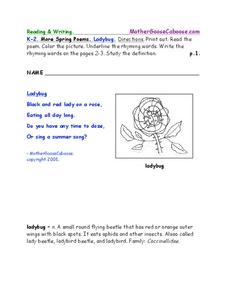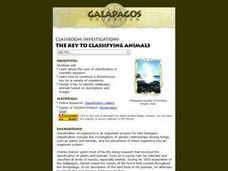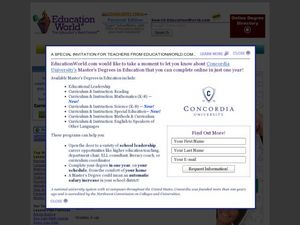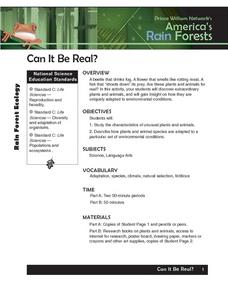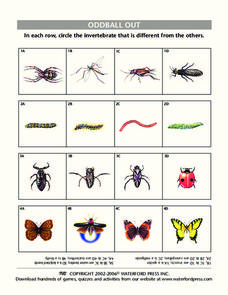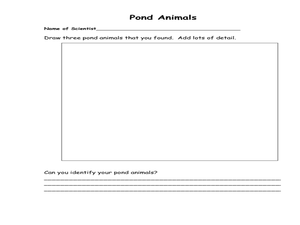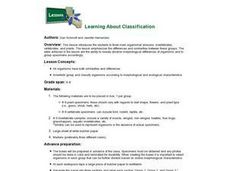Curated OER
Ladybug Poem
In this language arts worksheet, students study rhyming patterns and learn about ladybugs by reading a short poem and coloring a picture. Students also practice printing the word "ladybug" and create a poem or story of their own.
Curated OER
Ladybug Poem
In this poetry worksheet, students read the poem "Ladybug," color the picture, underline the rhyming words and then write the rhyming words on pages two through four.
Curated OER
Animal Signs
Students discuss the many different types of animal signs that can be used to identify and track animals. They participate in an hands-on activity in which they examine tracks, trails, homes, territory markings, and even "scat" left by...
Curated OER
The Key To Classifying Animals
Explorers of the environment construct a dichotomous key for a variety of organisms and design a key to classify Galapagos animals based on descriptions and images. The lesson includes a link to an animal gallery and the worksheet for...
Curated OER
A Remainder of One: A Math-Manipulative Lesson
Students listen to the reading of the book "A Remainder of One" and use math manipulatives to recreat "bug squadrons".
Curated OER
THE PEANUT WIZARD
Students read information about George Washington Carver and outline the information. They are given peanuts in the shell, students examine them and eat them. Students discuss the following questions: Why did George Washington Carver...
Curated OER
Honeybees are Vanishing
Students decide if they agree with a series of statements about the bee population, then read a news article about the disappearance of millions of U.S. honeybees. In this biology and current events lesson, the teacher introduces the...
Curated OER
Symbols of North Carolina
For this interactive North Carolina worksheet, 4th graders explore symbols of North Carolina. Students complete sixteen multiple choice questions about North Carolina.
Curated OER
Fifth Grade Life Science Review/Quiz
In this life sciences review or quiz instructional activity, 5th graders use recall of knowledge to answer multiple choice questions. Students answer 20 questions.
Curated OER
America's Rain Forests Can It Be Real?
Students examine the attributes of unusual plants and animals before determining how they are adapted to specific habitat. They complete an associated worksheet. They make posters with information that they find during research sessions.
Curated OER
Macroinvertebrate Sampling
Students identify macroinvertebrate species to investigate ecological systems and the relationship between humans and the environment.
Curated OER
Complete Metamorphosis
Students use a map and colored pins to plot the migration path of Monarch butterflies. They use data found at the Journey North website. Commas are also used in the activity to show how they are put in a series of words using butterfly...
Curated OER
Tree Friends
Students are introduced to tree structure and use. They identify their special tree using all senses except sight. Students identify six different internal parts within a cross section of tree trunk (bark, phloem, xylem, cambium,...
Curated OER
Mini-Ecosystems
Third graders identify the living and non living things in a book read aloud and discuss the interactions represented in the book. Then, they research and include a list of food that each animal needs in an ecosystem. Finally, 3rd...
Curated OER
Development in Drosophila melanogaster
Pupils study the least familiar aspect of development in Drosophila melanogaster; the development of the pupa. Students isolate and culture "First-day" pupae. They are dissected daily to study the progressive developmental changes.
Curated OER
Food Web
Students are able to define food web, and identify the interdependence of organisms within a system. They are able to describe how natural events and human activities can impact a food web.
Curated OER
Oddball Out
In this science worksheet, students examine 4 pictures in a row and circle the invertebrate that is different from the others. There are 4 rows of pictures. Answers are provided upside down on the page.
Curated OER
Trees at Work... Just Look!
Pupils investigate the significance of trees. They collect magazine pictures of animals that live in trees, list products that are made from trees, collect twigs and create an item using the sticks, and bring in and discuss food from trees.
Curated OER
Reading - Glaciers
In this online interactive glaciers worksheet, students respond to 10 fill in the blank and multiple choice questions regarding the information included in the provided paragraphs.
Curated OER
Pond and Pond Organisms
Students explore pond ecosystems. In this pond organism activity, students will use pond water and a plastic bad in order to locate and identify freshwater organisms. The activity is designed for younger grades, but...
Curated OER
Create a Soil Aggregate
Young scholars simulate the conditions which occur in a soil aggregate. They explain how IPM affects the environment. They identify the cast of characteristics to develop their aggregate.
Curated OER
Learning About Classification
Students explore the three main organismal divisions. Students classify organisms by invertebrates, vertebrates, and plants. They observe the differences and similarities between these groups.
